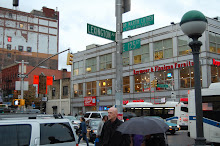Metal Machine Trio - Lou Reed on guitars, Ulrich Krieger on tenor saxophone and Sarth Calhoun on continuum and live processing - opened their first European tour in Cambridge to enthusiastic audience reaction. Although named after Lou Reed's 1975 album Metal Machine Music, this trio does not attempt a faithful recreation of the album as has been done with so many classic albums, including Reed's own Berlin. Instead, they play music inspired by it and in a similar vein; the publicity advertised, "A NIGHT OF DEEP NOISE" and, just in case anyone imagined that Lou Reed might perform "Perfect Day" or "White Light White Heat", it added, "NO SONGS. NO VOCALS". Nonetheless, a small proportion of the audience had obviouly not read that and did seem to hold out hopes that Reed would sing...
From the moment that the audience entered the gig, such hopes were challenged and soon dissipated. Onstage, alone, four electric guitars lent against speakers, feeding back in a recreation of the methodology of the original Metal Machine Music album. Initially, the resulting sounds were not the high pitched screech many would associate with the word "feedback", but a more organic throbbing sound. Intermittently, one or more of the trio would visit the stage to tinker with the levels, thus shifting the characteristics of the feedback. As the time approached for the trio to take the stage, the feedback became louder and more bass heavy, a sound sure to get adrenaline pumping and set pulses racing.
The trio performance was a tour-de-force unbroken set of two hours. The three players played a variety of music that encompassed ambient, industrial, noise, rock, r'n'b and more. For much of the time the focus was on Reed and Krieger, with the saxophonist being the more extrovert performer. At the side of the stage, Calhoun was a constant hive of activity but he never sought the limelight, preferring to let his music speak for itself.
Despite the length of the set and its comprehensive approach, once it was over the audience applauded and called for more. It was difficult to see what the trio could add to what they had already produced. After this gig, the trio moved to Oxford and London and then across Europe. Always NO SONGS. They don't need them!
If you missed the tour, here is You Tube footage from their appearance in Copenhagen on April 24th 2010:
If you missed the tour, here is You Tube footage from their appearance in Copenhagen on April 24th 2010:


